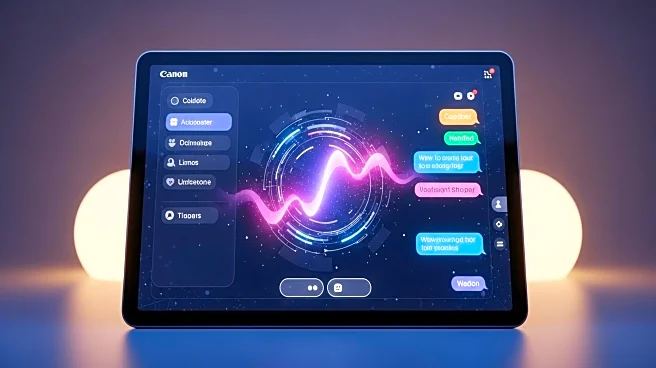What is the story about?
What's Happening?
A recent survey conducted by Vantage Point, a Texas-based counseling service, indicates that nearly 30% of surveyed adults have reported engaging in romantic relationships with AI chatbots. This survey, which involved 1,012 adults, suggests a significant level of interaction with AI companions, although the methodology used was more akin to an informal poll rather than a scientific study. The findings contrast with data from Match.com and the Kinsey Institute, which reported that 16% of adults have interacted with AI as romantic companions. The survey highlights a growing trend, particularly among younger generations, with 23% of Millennials and 33% of Gen Zers reporting romantic interactions with AI. Despite these figures, skepticism remains about the prevalence of such relationships, with other studies indicating lower engagement levels.
Why It's Important?
The increasing engagement with AI chatbots for romantic relationships reflects broader societal shifts towards digital companionship. This trend could have significant implications for the technology industry, as companies may invest more in developing sophisticated AI companions. It also raises questions about the impact on traditional human relationships and the potential for AI to address loneliness. However, ethical concerns persist regarding the reliance on AI for emotional support and the definition of infidelity in relationships involving AI. As AI technology continues to evolve, it may challenge existing norms and expectations around human interaction and companionship.
What's Next?
As the trend of AI companionship grows, it is likely that more research will be conducted to understand its implications on human relationships. Companies may explore new markets for AI companions, potentially leading to advancements in AI technology tailored for emotional support. Additionally, societal debates may arise regarding the ethical considerations of AI in personal relationships, prompting discussions on regulation and guidelines. Stakeholders, including psychologists and relationship experts, may weigh in on the potential benefits and drawbacks of AI companionship, influencing public perception and policy.
Beyond the Headlines
The rise of AI companions could lead to long-term cultural shifts in how relationships are perceived and managed. It may challenge traditional notions of intimacy and companionship, prompting a reevaluation of what constitutes a meaningful relationship. Furthermore, the integration of AI into personal lives could influence future generations' understanding of emotional intelligence and interpersonal skills, potentially altering family dynamics and social interactions.

















